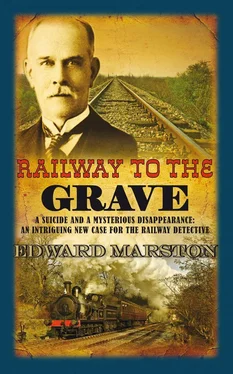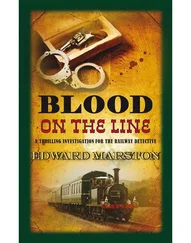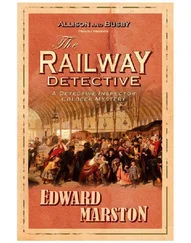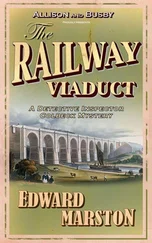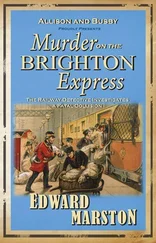Edward Marston - Railway to the Grave
Здесь есть возможность читать онлайн «Edward Marston - Railway to the Grave» весь текст электронной книги совершенно бесплатно (целиком полную версию без сокращений). В некоторых случаях можно слушать аудио, скачать через торрент в формате fb2 и присутствует краткое содержание. Жанр: Исторический детектив, на английском языке. Описание произведения, (предисловие) а так же отзывы посетителей доступны на портале библиотеки ЛибКат.
- Название:Railway to the Grave
- Автор:
- Жанр:
- Год:неизвестен
- ISBN:нет данных
- Рейтинг книги:5 / 5. Голосов: 1
-
Избранное:Добавить в избранное
- Отзывы:
-
Ваша оценка:
- 100
- 1
- 2
- 3
- 4
- 5
Railway to the Grave: краткое содержание, описание и аннотация
Предлагаем к чтению аннотацию, описание, краткое содержание или предисловие (зависит от того, что написал сам автор книги «Railway to the Grave»). Если вы не нашли необходимую информацию о книге — напишите в комментариях, мы постараемся отыскать её.
Railway to the Grave — читать онлайн бесплатно полную книгу (весь текст) целиком
Ниже представлен текст книги, разбитый по страницам. Система сохранения места последней прочитанной страницы, позволяет с удобством читать онлайн бесплатно книгу «Railway to the Grave», без необходимости каждый раз заново искать на чём Вы остановились. Поставьте закладку, и сможете в любой момент перейти на страницу, на которой закончили чтение.
Интервал:
Закладка:
Railway to the Grave
Edward Marston
CHAPTER ONE
1855
Colonel Aubrey Tarleton led an orderly existence. Born into a military family and subject to the dictates of a martinet father, he’d been educated at a public school that prided itself on its strict regime. When he joined the army, therefore, he was already accustomed to a life within prescribed limits. He felt supremely comfortable in uniform and, as succeeding promotions came, he gloried in his position. His father had never risen above the rank of major. To acquire a colonelcy and thereby better the man who’d sired him was, to Tarleton, a source of intense satisfaction. He carried that satisfaction into his retirement, finding, in civilian life, the deference to which he felt entitled.
‘Is that all you want, Colonel?’ asked his housekeeper, softly.
‘That is all, Mrs Withers,’ he replied.
‘As a rule, you have such a hearty breakfast.’
‘I don’t feel hungry this morning.’
‘Shall I make you some more coffee?’
‘No, thank you.’
‘Very good, sir.’
With a respectful nod, Mrs Withers backed out of the dining room. She was a handsome woman of middle years with an ample frame held firmly in place beneath her dress by steadfast stays. Retreating to the kitchen, she waited until she heard Tarleton ascending the staircase, then she snapped her fingers at the girl who was cleaning the knives with emery powder. Subdued in the presence of her employer, the housekeeper now became peremptory.
‘Clear the table,’ she ordered.
‘Yes, Mrs Withers,’ said Lottie Pearl.
‘And be quick about it.’
‘Did the colonel eat anything today?’
‘That’s none of your business, girl.’
‘I was only wondering.’
‘You’re not paid to wonder.’
‘No, Mrs Withers.’
‘Now do as you’re told.’
Lottie scurried out with a tray in her hands. She was a scrawny girl of sixteen and, as maid-of-all-work, was a relative newcomer to the house. In awe of Colonel Tarleton, she was frightened of the stern housekeeper and of her curt reproaches. Creeping tentatively into the dining room, she looked at the untouched eggs and the half-eaten piece of bread on the plate. Only a few sips had been taken from the cup of coffee. The sound of heavy footsteps in the bedroom above made her glance warily up.
Tarleton was on the move, crossing to open the wardrobe in order to examine its contents before walking to the window to look up at the sky. When he’d taken his usual morning walk with the dog before breakfast, there’d been more than a hint of rain in the clouds but they seemed to have drifted benignly away, allowing the sun to come into view. On such an important day, he was determined to dress well. After removing the well-worn corduroy suit he kept for his rambles through the countryside, he changed his shirt and put on his best trousers, waistcoat and frock coat. Shining black shoes, a fob watch and a cravat completed the outfit. Tarleton studied himself with care in the cheval mirror, making a few adjustments to his apparel then brushing back some strands of thinning white hair.
Taking a deep breath, he crossed to the door that led to the adjoining room and tapped politely on it. Though there was no response from within, he opened the door and gazed wistfully around. Everything in the room was a cherished keepsake. His eyes took in the paintings, the vases, the plants, the ornaments, the jewellery box, the furniture, the Persian carpet and the more functional objects before lingering on the double bed. On the wall above it was a beautiful Dutch tapestry that set off a surge of fond memories and he permitted himself a moment to savour them. After bestowing a wan smile on the room, he withdrew again and closed the door gently behind him as if not wishing to disturb its occupant. Then he collected his wallet, his spectacles and a folded sheet of paper. The last thing he picked up was a large safety pin.
Mrs Withers was waiting for him in the hallway, holding his top hat. As he took it from her, she indicated the letter on the table.
‘The postman came while you were upstairs, Colonel,’ she said.
‘I’ve no time to read the mail now, Mrs Withers.’
‘But there might be news.’ She quailed slightly as he turned to stare at her with a mingled anger and pain. Writhing under his glare, she gestured apologetically. ‘Forgive me, sir. I spoke out of turn. You know best, of course.’
‘Of course,’ he emphasised.
‘Do you have any orders for me?’
‘Remember to feed the dog.’
‘I will, Colonel.’
‘Goodbye, Mrs Withers.’
‘What train will you be catching back from Doncaster?’
‘Goodbye.’
It was a brusque departure. He didn’t even wait for her to use the clothes brush on his coat. Putting on his hat and picking up his walking stick, he let himself out of the house and strode off down the drive. Face clouded with concern, the housekeeper watched him through the glass-panelled door but Tarleton did not look back. His tall, erect, still soldierly figure marched briskly away towards the main gate as if on parade before royalty.
South Otterington was a pleasant, scattered village on the east side of the River Wiske, large enough to have a railway station, three public houses, two blacksmiths and a cluster of shops, yet small enough for each inhabitant to know everyone else in the community. Colonel Tarleton was a familiar sight there, a member of the gentry held in high esteem as much for his heroic feats in the army as for his social position. When he’d walked the mile or so from his home, he entered the main street to be greeted by a series of ingratiating smiles, polite nods and obsequious salutes. He acknowledged them all with a lordly wave of his walking stick. Nan Pearl, returning from the butcher with scraps for her mangy cat, all but curtsied to him, desperately hoping for a brief word of praise for her daughter, Lottie, now in service at the Tarleton household. Instead she got an almost imperceptible nod. Mrs Skelton, the rector’s wife, on the other hand, merited a tilt of his top hat and a cold smile that flitted across his gaunt face.
Though he seemed to be heading for the railway station, he walked past it and continued on until he’d left the village behind him and was out into open countryside. Fields of wheat and barley lay all round him. Sheep were grazing contentedly on a hillside. There was fitful birdsong but it only increased the extraordinary sense of peace and tranquillity. Tarleton had always loved his native Yorkshire and never tired of roaming the North Riding on foot. This time, however, he took no pleasure from the surroundings. His mind was concentrated on a single goal and nothing could distract him from it.
He kept on until he judged himself to be midway between the village and Thirsk to its south. At that point, he clambered over a gate and picked his way across a wheat field until it dipped down towards the railway line. He was still spry enough to climb over the dry-stone wall without difficulty, straightening his hat when he reached the track then slipping a hand inside his pocket. He took out the sheet of paper and used the safety pin to secure it to his coat like a medal. A glance at his watch told him that he had timed his arrival perfectly. Dropping the watch back into his waistcoat pocket, Tarleton took a deep breath and inflated his chest.
He was ready. Keeping between the rails, he walked over the sleepers with a measured tread. He was quite untroubled by fear. When he heard the distant noise of an approaching train, he sighed with joy. His ordeal would soon be over.
Halfway between Thirsk and South Otterington, the train was travelling at full speed. Standing on the footplate, the driver and the fireman were chatting happily together. The journey had passed without incident and they could congratulate themselves on their punctuality at each stage. When they came round a long bend, however, their good humour vanished. The driver saw him first, an elderly gentleman walking uncaringly towards them on the track as if out on a morning stroll. The fireman could not believe his eyes. Cupping his hands, he yelled a warning at the top of his voice but it was drowned out by the frenzied panting of the locomotive and the ear-splitting rattle of the train. Even the shrill blast of the whistle did not deter the oncoming walker. His gait remained as steady as ever.
Читать дальшеИнтервал:
Закладка:
Похожие книги на «Railway to the Grave»
Представляем Вашему вниманию похожие книги на «Railway to the Grave» списком для выбора. Мы отобрали схожую по названию и смыслу литературу в надежде предоставить читателям больше вариантов отыскать новые, интересные, ещё непрочитанные произведения.
Обсуждение, отзывы о книге «Railway to the Grave» и просто собственные мнения читателей. Оставьте ваши комментарии, напишите, что Вы думаете о произведении, его смысле или главных героях. Укажите что конкретно понравилось, а что нет, и почему Вы так считаете.
